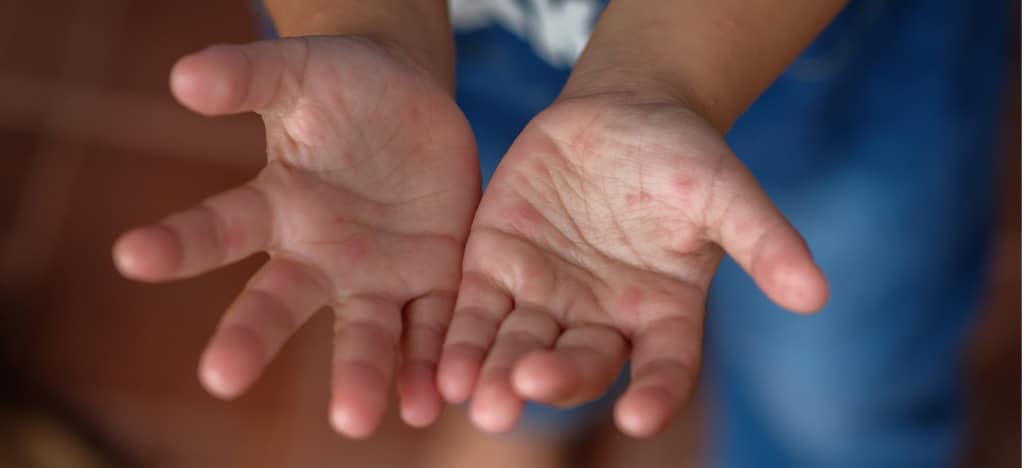 Hand Foot & Mouth Disease is a common childhood illness and young children are especially vulnerable.
Hand Foot & Mouth Disease is a common childhood illness and young children are especially vulnerable.
What exactly is HFMD? (And are there different strains?)
HFMD (Hand Foot & Mouth Disease) is a common and highly contagious viral illness caused by a family of viruses called Enterovirus. Both adults and children can contract HFMD, though children below five years old are most susceptible. It is endemic in Singapore, occurring year round with outbreaks often occurring in childcare centers and schools.
How does it spread?
The virus is spread from person to person by direct contact with the nasal secretions, saliva, stools, and fluid from the blisters of an infected person. Symptoms of HFMD usually take 3 to 7 days to show up after being infected. Specific immunity can occur, but a second or third episode is possible from a different strain of the virus.
What are the symptoms?
The illness usually begins with nonspecific symptoms of fever (lasts 2 to 3 days), poor appetite, and malaise. Some children may have a runny nose, sore throat, drooling or vomiting. One to two days after fever onset, children with HFMD will develop painful sores/ulcers in the mouth and a non-itchy rash, ranging from red spots or small blisters on the hands and feet. This is the hallmark of HFMD, hence gives the disease its name. Some may also have the rash around the mouth, buttocks, arms and legs. The illness is typically mild and self-limiting. Complications are uncommon. Very rarely do certain strain of the virus cause complications of the nervous system, lungs and heart.
When is a patient most infectious?
People are most contagious the first week they’re sick. The virus spreads easily in group settings like schools and childcare centers. In cooler climates, outbreaks most often happen in the summer and fall, but tropical parts of the world have them year-round.
Can adults get HFMD? Are symptoms worse for adults?
Adults and older children usually have a milder form of the disease, and they may pass on the virus without knowing they have it. Sometimes, they can have severe symptoms, but the treatment is the same for children and adults.
How is HFMD treated?
Most children with HFMD are relatively well and active despite their illness. As HFMD is a viral illness, the treatment is supportive and is aim at easing discomfort. Pain due to mouth sores and discomfort due to fever can be simply be managed with ibuprofen or acetaminophen if needed.
Occasionally, severe ulcers in the mouth can be painful and may interfere with intake of food and drinks. It is important to encourage children to drink adequate fluids to prevent dehydration. Try cold foods such as popsicles, frozen yogurt, ice cream and soft foods such as porridge, pureed fruit, and gelatin.
What should I do if I suspect my child has HFMD? Do I go to my paediatrician?
The MOH advises that parents should consult the paediatrician early if they suspect their child may have HFMD. Also, informing your child’s childcare center or school early so they can monitor other children closely and take additional precautions.
What should I do if my child has HFMD?
Children with HFMD should remain at home and not attend childcare centers and schools. They should avoid any public places such as shopping malls, playgrounds, buses and trains. They should especially avoid contact with other children until all the blisters have dried up which typically take 7-10 days from the start of illness.
Is there any way to prevent HFMD?
Hand washing is the best protection. Remind everyone in your family to wash their hands well and often, especially after using the toilet, after changing a diaper, before meals, and before preparing food. Shared toys in childcare centers should be cleaned often with a disinfectant because the virus can live on these objects for days.
Kids who are sick with a coxsackievirus infection should be kept out of school or childcare for a few days to avoid spreading the infection.



































